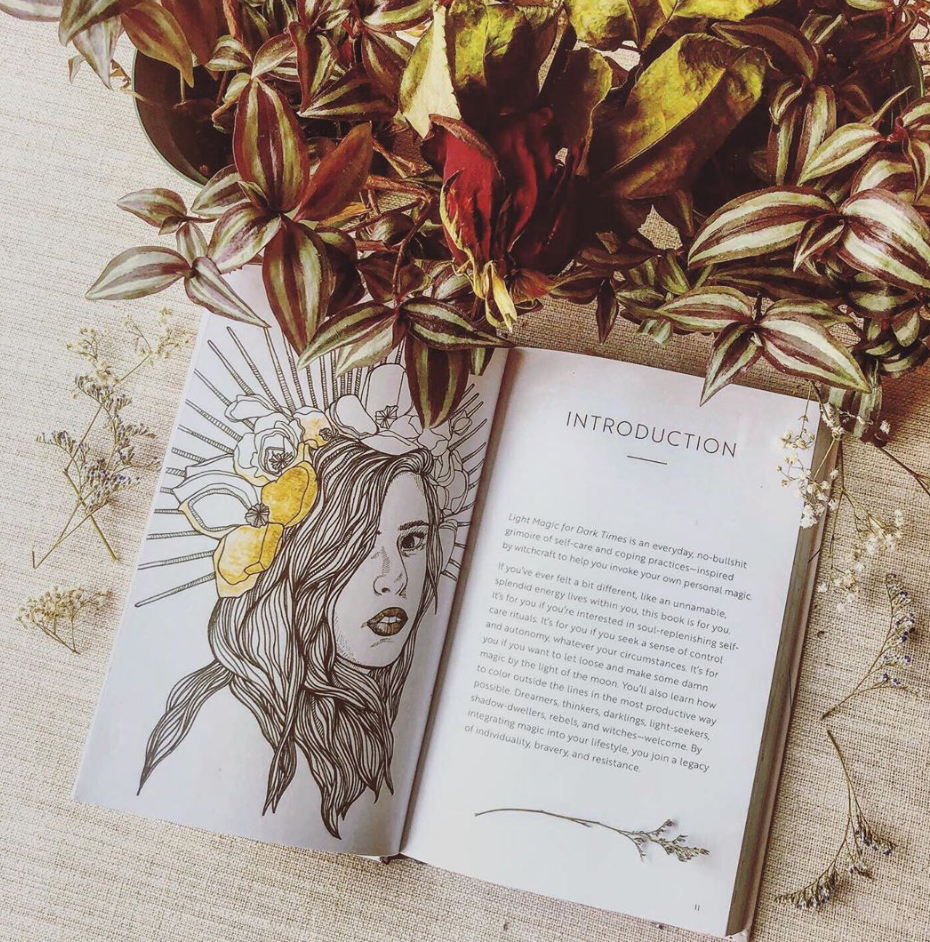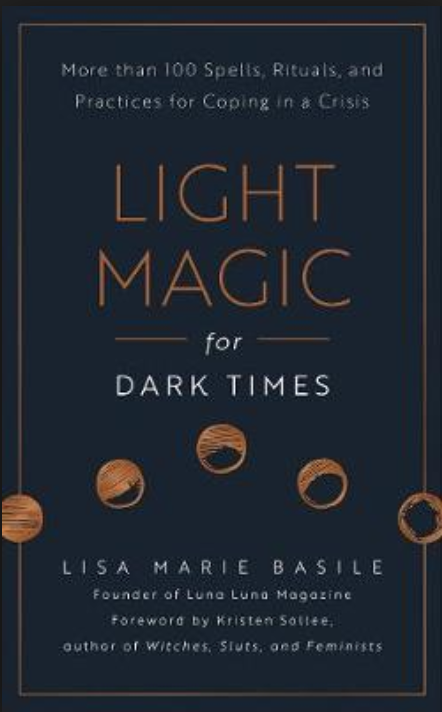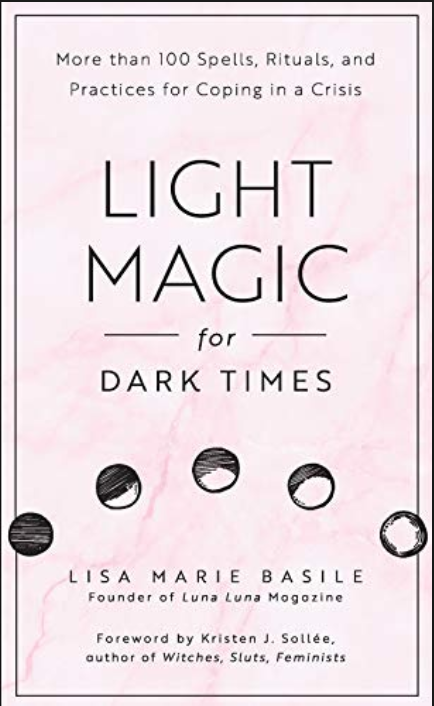BY LISA MARIE BASILE
Wild Words is an everyday, accessible, friendly series of how-tos around publishing, writing, and creating. It’s a response to the many inbox queries we get around writing (a lot of our readers come here for the literature, and also want to write!). There is no way these entries can be totally comprehensive, but it’s aimed to provide a general overview of any given topic. Feel free to leave questions (and additional advice!) in the comments below or tweet us at @lunalunamag.
Whether you’re looking to publish poetry, an essay, a researched piece, or a book, here are some of my responses to the questions I’m asked all the time. I hope it helps!
You are already a writer.
One of the things I hear the most is, "I'm not, like, a real writer yet, but I'd like to be. I don’t have anything published.”
Quiet that voice because—and may I be struck by lightning if I am wrong here—yes, yes you are a writer. If you write, you're a writer. That might sound like a platitude, but since when does publication provide our identity. Scribes were writing thousands of years before the printing press. I’m certain Thoth and Seshat never needed a book deal to feel valid — but I disgress.
The same goes for writers. There's this all-too-common myth that a writer isn't initiated into the dark mansion of writerly glory until published (see mantras like "publish or perish" or even well-meaning terms like "emerging writer"). You can very much be a writer without publishing credit. To be a writer is to live as a writer, not to work as one.
Step one: Get out of your head. Save your head for the page. Your art comes first; everything else is secondary. Being a writer is less important than writing. So, just write and the rest will come into place.
Now, there's a caveat to all that.
Writing is not always glamorous; you have to put in the work.
Writing is often said to be lonely. It's not just an over-romanticization of the archetype of the writer (as we fall upon the chaise, in solitude, our poems clamouring in our chests), it's a fact. It’s necessarily lonely in many ways. We’re alone at home, sitting in a dressing gown, downing coffee, assembling words through feeling and memory. We tend to alchemize best when alone.
Then, when we’re done with the work, we may choose to share it with the world. Publishing is made up of all the unglamorous, sometimes uncomfortable aspects art we don't want to think about: Formatting a manuscript, submitting to magazines and journals, getting declined, updating your "accepted" and "declined" excel sheets. It's all very Virgo. Add the admin work to the loneliness, and it can all feel quite daunting.
But the process itself can be beautiful. Through all of that, something is born — and that is extremely transformative. You just have to show up to it, no matter what you intend to do with what you conjure and write down, earth-side.
There are a sea of opportunities out there; finding them is your job.
So how do you find journals or magazines? To start, social media is a wonderful resource. You can start by searching 'literary journal' or 'poetry magazine’ on Twitter or Instagram’s search bar. Then, read the journal. Yep, actually read it.
Does the work resonate with you?
Does the journal's niche work well with your voice?
Does the journal stand for what you believe in?
Do they take risks on style and genre?
Is the website legible and clean? Is the font in alignment with your work? (There’s nothing worse than a beautiful poem being destroyed by an ugly font).
If it’s a print journal, how does it look on the page?
Do they make a point to welcome diverse writers?
Next, make lists of writers you admire.
Who are they? What do they write? Is it ‘similar to what you write?
Where have they published? You can see this by looking at their bios or Googling their names. Most published works come with a biography of the writer.
Are they recommending certain journals via their social media or blog?
Another easy way to find literary journals is by perusing your local bookshop; most indie stores have a dedicated literary magazine section. One of my favorite resources for literary journals (in this case, most are English-speaking ones) is at Entropy Magazine. They do an amazing service to writers by finding open submissions and separating them into journals, presses, and genres.
Facebook has some great groups, as well. Search "poetry writers" or "fiction writers" or "memoir writers" under groups and see what comes up.
Engage with other writers, read their work, and ask for recommendations to literary journals.
13 AESTHETICALLY BEAUTIFUL LITERARY JOURNALS TO SUBMIT TO & READ
The beautiful thing about the Internet is that you have at your disposal hundreds of literary journals and magazines—as well as their "submit" or "contact" information. This info will list what they’re looking for and how to send it to them.
Follow the rules. Don't attach a whole book, for example, if they ask for three poems only. Seriously. This inspires ire and bloodlust in some editors. Now, no one is waiting around for you to make a mistake, and you don’t have to stay awake at night quaking in your sheets over understandable errors that happen, but do read the submissions policy and adhere to it in the most basic of ways.
Make lists of journals or magazines or presses that you like, take note of their publication schedules, and get your work ready. Send your favorite pieces to your favorite journals. Then, you wait. This is the sexy part (not true).
What is a pitch?
If you're trying to submit your writing to magazines (especially nonfiction or essays), you'll want to know there are usually two ways to go about this: You can pitch (aka send a clear idea) an editor directly (you can find emails for editors on social media or by going onto LinkedIn) and then wait for confirmation and the assignment, or you can write a whole piece and send it to a magazine via whatever their submissions policy says.
The latter is risky for one reason: You run the risk of writing and writing without it having a home. That said, you should be writing about what you want to write about—so even if it's rejected, you can return to the drawing board and send it elsewhere.
Pitching editors seems scary, right? This is probably the question I'm asked most often: Should I pitch an editor? Will they ignore me if I've never published before? Why would they want to hear from me? Am I good enough?
Firstly, yes. You’re good enough. Secondly, many editors are super busy and many pitches don't get responses (it’s a limited bandwidth issue; it’s usually not you). Please do not take this personally.
What helps? Writing a succinct, clear, well-developed pitch may yield an acceptance or at least a responsive decline. Editors appreciate pitches because it lets them collaborate with you—to massage an idea into being and to ensure the piece covers the topic in the way they envision.
Pitches should include a well-developed idea, a reason why you're the one who should write the piece (keep this relevant, quick, and professional) and a sentence or two about why it would work for their publication. Here are some excellent tips.
THE IMPORTANCE OF AN AUTHOR WEBSITE AND SOCIAL MEDIA CHANNELS
Many writers loathe the idea of having to step away from the writing desk to maintain a digital persona. I have a love/hate relationship with it. Being online helps me find and build community. However, it can be distracting, narcissistic, and one-dimensional. Striking a balance while enacting healthy boundaries is key — especially as a highly sensitive, in-tune creator (as we all are).
We are, at times, reduced to parts of ourselves online—we are seen in fractions, and this can cause us to feel a disconnect to our main intentions. Then there's the issue of imposter syndrome. When you see all the other writers online being amazing and publishing everywhere and getting retweets, you might wonder: Am I good enough?
There is space for everyone (a glorious truth no troll can take away from you) and that space is what makes writing such a beautiful experience. Everyone starts somewhere. Let the Internet be a place of support and inspiration for you, but don't let it distract from your art. You're a writer; brand is not the main priority. Share ideas and content authentically around a few pillar topics, engage thoughtfully, promote others, and embrace a schedule so that you don’t fall down the rabbit hole.
An author website (with a short bio, a picture, and some contact details) can go a long way. Don't worry about it being sparse at first. Your bio can be "XYZ is a writer from New York City." It's not embarrassing if it’s short; there's no rush to fill it up with details, and there's no competition. Be you, write, and the rest will unfold. You can build websites at Weebly, Squarespace, Wix, and even Tumblr. Luna Luna uses Squarespace and we love it. My personal author website is on Squarespace as well.
self-publishing & vanity presses 101
Ever see those commercials or ads that say, "Publish a book for only $3999.00!"? Yeaaaaah. These services are, well, scammy simply because you could self-publish on your own for very little money (although you will pay for author copies and shipping) through several low-cost self-publishing services like Amazon’s Kindle Direct Publishing, Cafepress, and Lulus. More on that below.
So what’s the deal with vanity presses (aka vanity publishers, subsidy publishers or hybrid publishers)? These are presses that typically ask writers (and in some cases agents) to subsidize a portion or all of the funds that it takes to put a book into the world. Some are straight-up shams designed to fuck people over and prey on a lack of knowledge, while others are working presses that are very transparent about their fees. Here’s a very basic look at the variants within the hybrid publishing model.
There have been plenty of debates around whether this publishing model is okay or not, and lots of wonderful writers have worked with vanity presses before; others maintain that it’s not for them and that your press should foot your bill.
Generally speaking, most established magazines or presses will publish your work for free. Most authors don’t pay their publishing companies to publish their work. Whether or not you get royalties or an advance is entirely dependent on the press.
Back to self-publishing: Poets & Writers offers great information around self-publishing here. The fact is, some writers love the autonomy and creative power they get when publishing their own work. Many writers would prefer not to self-publish, too, and if you put your ear to the ground you'll hear lots of contradictory talk, everything from "self-publishing isn't really publishing," to "Why would I want someone else in control of my manuscript?"
Many writers who are simply experimenting and want to carry a book with them to local readings might want to self-publish. Maybe they want sell their work on Amazon directly or on Etsy. Many writers may feel disenfranchised by the publishing scene. Many might just like the process of creating their own work.
There is still very much a stigma around self-publishing, but it's important to stay progressive when it comes to art. People should feel empowered to create however they'd prefer. Not to mention, people have self-published for years. It's a hard world out there for writers, and no one needs to be shamed for their choice. That said, it's important to weigh the options.
No matter what—self-published or not—the post-publication stage is key: You’ll want to share your work.
how to promote your published work
Promotion doesn’t come naturally for many writers. Whether it’s a general distaste for capitalism, a tendency toward introversion, fear of rejection, or a fear of seeming obnoxious, promotion can be tricky — and surprisingly emotional.
If you want your book to reach people, you’ll have to promote it. Remember that many presses have either very limited budgets or limited bandwidth. This means you'll be expected to reach out to reviewers, drum up public conversation around your work, and do a lot of the leg work when it comes to promotion.
Here's the cold hard truth: No one will read your work if you don't advocate for it from conception and execution to submission and promotion. Period.
So how do you go about getting people to read your work?
Promote your work, and everyone else's, too. You can’t just drop one link to your poem one time and expect engagement. Be active, thoughtful, and mindful.
Start a newsletter and send out updates on your work. Even if only 20 people are subscribed, ask them to share with others. Word of mouth is powerful.
Take part in conversations around writing online. Join groups or jump in on Twitter conversations.
Create graphics that promote your book or highlight a few lines of poetry. I create all my graphics with Canva.
Read your work on Instagram live. Invite others to join the Live and read their work, too.
Go to literary readings if you can access them. Meet people IRL. Create your own literary reading and host it in person or on Zoom.
Create a new space. Write a blog. Fill a gap in conversation. Be the representation you’re seeking. Start a lit journal.
Be human; people read humans. There's no greater secret to this.
…but privilege is a thing, right?
Sometimes writers have it hard. They might work stressful, full-time jobs or lack finances; they raise families, they have chronic health conditions, or they are disenfranchised in ways you or I can't imagine. Many are systemically silenced or excluded by sexism and rampant, deep-seated racism. Others can't attend fancy writing workshops usually and sometimes they can't even access conferences due to the fact that spaces are straight-up inaccessible to disabled writers.
Recognizing your privilege is a necessity. This is why it's important to help other writers succeed; you never know their situation, and you never know what they've gone through to get where they are. Open doors for people.
Now, onto questions from our readers:
"How do I quite the voice that tells me I'm a shitty writer?"
That voice is like the sea. It is natural. It ebbs and flows, it pulls in and crashes to shore, and it pulls back. It intersects with our culture, use of social media, how we were raised, our mental health, our social life, and our internalized responses. That’s heavy, so don’t think you’re alone in this. That voice is an albatross to many.
Sometimes it's a deep blue, high tide, sometimes it's low, low enough for you to see your feet down there on the sand through the turquoise. This is what it means to write. There are days when you don't want to, don't feel the need to, don't feel like it means anything. When you doubt your ability or purpose.
Why write when others are already so talented? Why am I not as good? Why does this suck?
The sea often yields surprises. What happens when one day the waves don't stop? Will you ignore it? Will you say it's too overwhelming—or will you say it's necessary and beautiful?
Very few writers truly think they are god's gift to humankind; sure, there's ego out there, but it's usually driven by insecurity. Even the best feel it. It's chronic, and can be seriously limiting. However, you have to push past it. Turn the insecurity into fuel. Acknowledge it and let it pass.
You have to know that your relationship to your work (and your personal, very real reason for creating it) is more important than your mood on any given day, more important than what other people are doing, and more important than the ego. Write because you feel the need to, and trust, as you edit and develop it, that it is a thing of beauty. From there, decide whether you want to share it with the world.
The idea of something being shitty is usually predicated on ideas around how it will be received; so, write it for you, and you alone. The voice will happen. Just move through it. And don't beat yourself up for the sea change. Your voice will be there, and then go, and then come—what you choose to do, despite it, is what matters. Choose your work. It deserves love.
When your work is done, celebrate it. Get a drink, print it, decorate a little altar to it, and light a candle for your success. Focus on manifesting that spirit and resilience in your future projects. Grow your garden slowly, and with love—for all the darkness and light that comes with it.








































